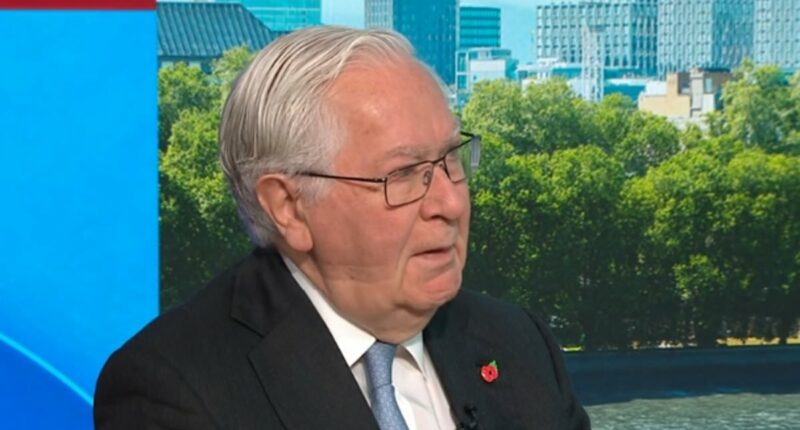Share this @internewscast.com
Today, former Bank of England Governor Mervyn King criticized Rachel Reeves’s proposal to impose a new mansion tax targeting affluent homeowners.
Baron King expressed his disapproval following reports that Chancellor Rachel Reeves intends to introduce a significant levy on properties valued over £2 million in the upcoming Budget.
According to details unveiled by the Mail on Sunday, this proposal would impose a 1 percent charge on the value exceeding £2 million for such properties.
For instance, owners of a £3 million home would face an annual tax bill of £10,000.
During an appearance on Sky News’ Sunday Morning with Trevor Phillips, Lord King, who led the Bank of England from 2003 to 2013, argued that the UK requires a more comprehensive tax strategy than what he described as plans “scribbled on the back of a cigarette packet.”
“This does not constitute a coherent tax strategy, and there is much to be gained by considering it thoroughly beforehand,” he stated.
‘Property taxes are an interaction between stamp duty, council tax, capital gains tax, inheritance tax.
‘You don’t solve that problem by just adding another wealth tax to it.’
Property experts condemned the policy as a ‘blunt and crude instrument’ which would distort the housing market and disproportionately affect older households, while the Tories slammed it as class-based and counter-productive.
The plan is the latest sign that Ms Reeves is preparing a raft of soak-the-rich measures in the Budget – possibly including a manifesto-busting hike in income tax and the slashing of pensioners’ tax-free allowances – as she struggles to fill a £40billion hole in the public finances.

Baron King lashed out after it was revealed the Chancellor Rachel Reeves could hit those with homes worth more than £2million with a punitive levy in the Budget next month

Rachel Reeves could hit homeowners with a new mansion tax costing thousands of pounds a year as part of a class war plan being considered for next month’s Budget

Previously it has been reported that Ms Reeves could look at a property tax on homes of all values as a replacement for council tax. Analysis of such a plan by the Institute for Fiscal Studies in 2020 showed that such a move would soak homeowners in the affluent south
Previously it has been reported that Ms Reeves could look at a property tax on homes of all values as a replacement for council tax.
Analysis of such a plan by the Institute for Fiscal Studies in 2020 showed that such a move would soak homeowners in the affluent south, increasing their tax bill by up to 410 per cent, while cutting average bills in the north and Scotland.
Asked if higher taxes on the wealthy would feature in her crucial statement next month, Rachel Reeves this month said: ‘That will be part of the story.’ But she denied it would spark an exodus of better-off Britons.
Preparations for the Budget are being led by Treasury Minister Torsten Bell, who worked as Ed Miliband’s director of policy when, as party leader, he included the mansion tax in Labour’s 2015 general election manifesto.
Under that plan, people with homes worth between £2million and £3million would have paid £3,000 a year in extra taxes, while owners of homes worth tens of millions and second home owners would have paid much higher rates.
The ‘1 per cent’ proposal would be similar to the Liberal Democrats’ policy in the 2010 general election, and could raise between £2billion and £3billion for the Exchequer.
Shadow Chancellor Mel Stride said: ‘Keir Starmer and Rachel Reeves promised not to raise taxes, now we know they are planning to do just that. If Starmer and Reeves introduce a so-called mansion tax, they will be punishing aspiration and hitting hard-working people. This isn’t fairness, it’s class war.
‘If Rachel Reeves had a backbone, she’d get a grip of spending – including the welfare bill – instead of raising taxes again and chasing out the very wealth creators our economy depends on.
‘Under Labour, nothing is safe – not your job, your home, your savings or your pension. Rachel Reeves will tax your children’s future to pay for her failure.’
The plans come as exclusive new polling reveals the collapse in public confidence over the state of the economy.
The survey, conducted by former Conservative deputy chairman Lord Ashcroft and shared with The Mail on Sunday, shows that just 1 per cent of voters think that the economy will fare ‘very well’ over the next year. Nearly three quarters, 73 per cent, think that it will perform badly.

Exclusive polling (above) conducted by Lord Ashcroft and shared with The Mail on Sunday reveals the collapse in public confidence over the state of the economy
Tory leader Kemi Badenoch and Mr Stride are preferred over Sir Keir Starmer and Ms Reeves in terms of running the economy by 28 per cent to 25 per cent.
The poll also finds that nearly half of all voters, 45 per cent, think that Ms Reeves should not break Labour’s manifesto promises over tax.
Introducing a mansion tax would require a complicated and bureaucratic property revaluation, as the current council tax bands are based on the property values of April 1991.
Last week, The Mail on Sunday revealed that Ms Reeves was also considering introducing new council tax bands for higher-valued properties.
Until last year, Mr Bell was the chief executive of the Resolution Foundation think-tank, which proposed a root-and-branch reform of property taxation in the UK. It floated the idea of scrapping council tax and replacing it with a flat charge of 0.5 per cent of a property’s value every year.
The foundation also proposed ripping up the current inheritance tax system and replacing it with a new one that levies tax on individual heirs, not estates, with a lifetime tax-free allowance of £125,000, a basic rate of 20 per cent tax on inherited income up to £500,000 and a 30 per cent tax on income of more than £500,000.
Lucian Cook, head of residential research at estate agent Savills, said that a mansion tax targeting homes worth more than £2million was a ‘very blunt and crude instrument’ that was unlikely to truly target the wealthy.
He said: ‘There’s a big difference between someone in a £2million house without a mortgage and someone with a sizeable mortgage. So it doesn’t necessarily capture net wealth at all.’

Torsten Bell (pictured) is leading the new Budget preparations – he worked for Ed Miliband’s when he included the mansion tax in Labour’s 2015 general election manifesto

Under Bell’s 2015 plans, people with homes worth between £2million and £3million would have paid £3,000 a year in extra taxes (Stock Image)
He added that it was ‘very difficult to get accurate valuations’ of properties worth over £2million as such houses tend to be ‘quite specific properties, so administering this tax is going to be expensive because any valuation is likely to be contested’.
Mr Cook also said ‘older retired households’ who had seen the value of their property increase over a long period of time could be caught by the mansion tax but ‘not necessarily have the means to pay for it’.
Neal Hudson, founder of housing market data firm Residential Analysts, said the fact a mansion tax was being considered meant the Treasury was likely ‘looking at this as a way of raising revenue’ and was not ‘particularly concerned about the efficiency or fairness of the property market.’
He said: ‘There’s a danger this will have some fairly negative impacts. The top end of the market has been stagnating for the last decade already as it’s been hit by higher rates of stamp duty.
‘So this will just depress transactions even more. [The Treasury] might make more money from an ongoing tax but you might find there are suddenly a lot of properties priced just below £2million.’
He also predicted ‘lots of legal challenges to work through’ as homeowners contested the valuation of their properties if they fell within the threshold of the tax.
‘There will be a lot of unhappy estate agents in Central London if it happens,’ Hudson added.
A Treasury spokesman said: ‘The Chancellor makes tax policy decisions at fiscal events. We do not comment on speculation around future changes to tax policy.’


















